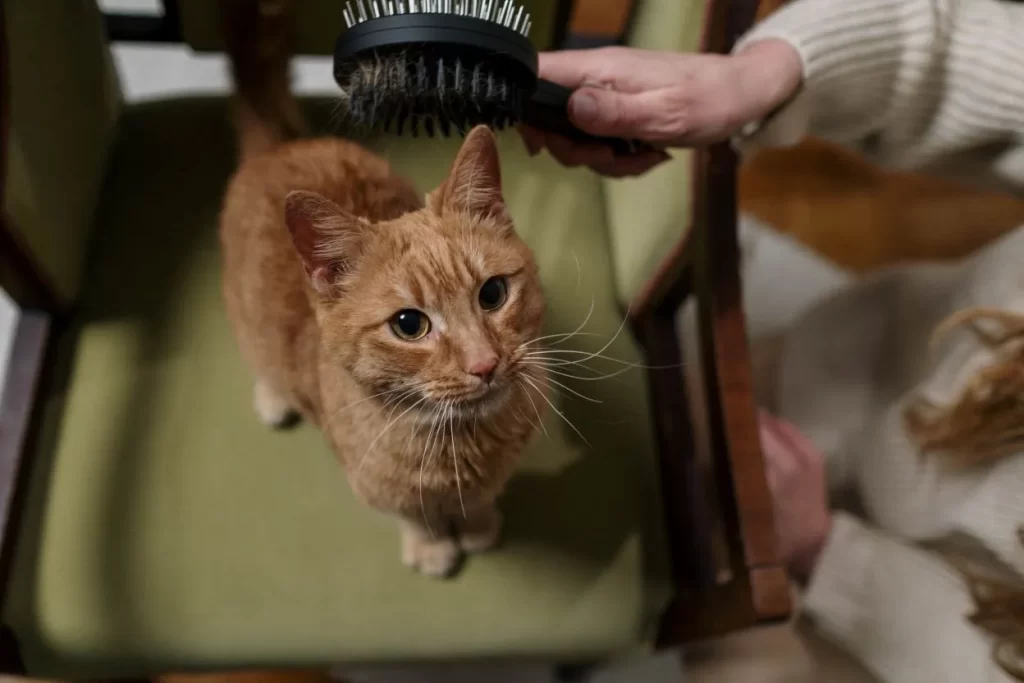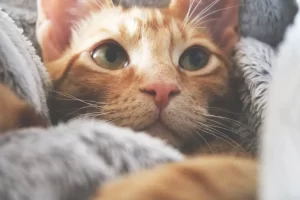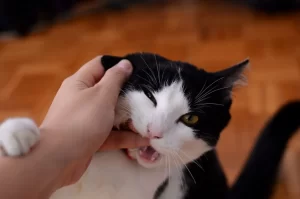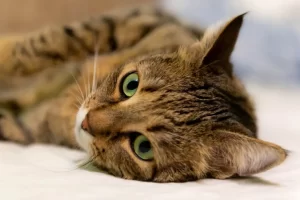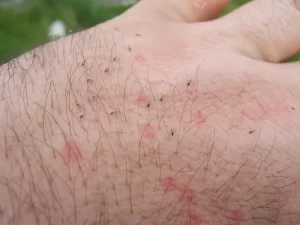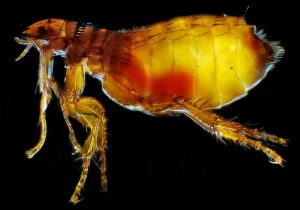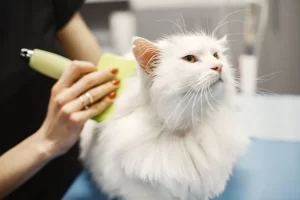Ringworm is a common fungal skin infection that affects cats and other animals, including humans. It’s caused by a type of fungus called dermatophytes, which feed on keratin, the protein found in skin, hair, and nails. Ringworm can cause itchy, scaly, and crusty skin lesions, and it’s highly contagious, meaning it can easily spread from one animal to another. Fortunately, there are many home remedies and veterinary treatments that can help manage and treat ringworm in cats. In this article, we’ll explore the causes, symptoms, and home remedies for ringworm in cats, as well as tips for preventing the spread of this infection.
Table of Contents
ToggleWhat is ringworm in cats?
Ringworm in cats, also known as dermatophytosis, is a common skin infection caused by various species of dermatophyte fungi. The term “ringworm” is actually a misnomer as it is not caused by a worm, but by a fungal spore. The infection affects the hair and outer layers of the skin and is highly contagious to both animals and humans. In cats, ringworm can present as circular, scaly patches on the skin, hair loss, and brittle or broken hairs. In severe cases, the skin may become thickened and infected, leading to secondary bacterial infections. Early diagnosis and treatment are important to prevent the spread of the infection and to minimize the risk of secondary infections.
What does a cat ringworm look like?
Here is an example of ringworm on a cat’s leg (image source):
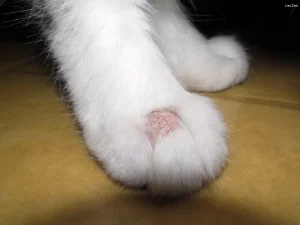
Causes of ringworm in cats
The causes of ringworm in cats are the dermatophyte fungi that infect the hair and skin. The following are the species of fungi that are known to cause ringworm in cats:
- Microsporum canis
- Microsporum gypsum
- Trichophyton mentagrophytes
- Trichophyton verrucosum
Ringworm in cats can be transmitted through direct contact with infected animals, contact with contaminated objects (such as combs, brushes, or bedding), or exposure to contaminated soil. It can also be spread to humans through close contact with infected cats. Cats with compromised immune systems, such as those that are elderly, sick, or undernourished, are more susceptible to developing ringworm.
Symptoms of ringworm in cats
The symptoms of ringworm in cats can vary depending on the severity of the infection and the age and overall health of the cat. The following are the most common symptoms of ringworm in cats:
- Circular patches of hair loss: These patches can appear anywhere on the body and are often scaly and red. The hair within the affected area may be brittle or broken.
- Scaling and crusting of the skin: The skin may become thickened and infected, leading to scaling and crusting. This can occur in severe cases and can be accompanied by secondary bacterial infections.
- Itching and discomfort: Cats with ringworm may experience itching and discomfort, especially in the affected areas. This can lead to excessive grooming and self-trauma.
- Brittle or broken hairs: The hairs within the affected areas may be brittle or broken, which can make the patches of hair loss more noticeable.
- Discolored nails: In some cases, the nails may become discolored, thickened, and deformed as a result of the infection.
It’s important to note that not all cats with ringworm will show symptoms, and some may only have mild symptoms.
Home remedies for cats with ringworm
Home remedies can be effective in treating mild cases of ringworm in cats, but it’s important to consult a veterinarian for proper diagnosis and treatment recommendations, especially for severe or persistent cases. The following are some home remedies for treating ringworm in cats:
- Tea tree oil: Tea tree oil has antifungal and antiseptic properties that can help to treat ringworm in cats. Mix a few drops of tea tree oil with carrier oil (such as coconut oil) and apply it to the affected areas. Be sure to dilute the tea tree oil, as undiluted tea tree oil can be toxic to cats.
- Aloe vera: Aloe vera has antifungal and anti-inflammatory properties that can help to soothe and heal the skin. Apply aloe vera gel directly to the affected areas.
- Apple cider vinegar: Apple cider vinegar can help to combat fungal infection and balance the pH of the skin. Dilute equal parts of water and apple cider vinegar, and use a cotton ball to apply the mixture to the affected areas.
- Coconut oil: Coconut oil has antifungal and antibacterial properties that can help to combat fungal infections and soothe the skin. Apply coconut oil directly to the affected areas.
- Garlic: Garlic has antifungal and antibacterial properties that can help to combat fungal infection. Crush fresh garlic and mix it with coconut oil. Apply the mixture to the affected areas.
- Honey: Honey has antifungal and antibacterial properties that can help to combat fungal infections and soothe the skin. Apply raw honey directly to the affected areas.
- Salt: Salt can help to dry out the fungal infection and soothe the skin. Mix salt with warm water, and use a cotton ball to apply the mixture to the affected areas.
- Turmeric: Turmeric has antifungal and anti-inflammatory properties that can help to soothe and heal the skin. Mix turmeric powder with coconut oil, and apply the mixture to the affected areas.
- Neem oil: Neem oil has antifungal and antibacterial properties that can help to combat fungal infection and soothe the skin. Apply neem oil directly to the affected areas.
It’s important to monitor your cat’s symptoms and seek veterinary care if the infection does not improve or if the symptoms worsen. Some home remedies may not be safe for all cats, and some may interact with other medications your cat is taking. It’s always best to consult a veterinarian before using any home remedies for your cat’s health.
Prevention of ringworm in cats
Preventing ringworm in cats can help to protect your cat’s health and prevent the spread of the fungal infection to other animals and people. The following are some steps you can take to prevent ringworm in cats:
- Practice good hygiene: Wash your hands thoroughly after handling infected animals or objects, and keep the litter box and food dishes clean.
- Keep your cat healthy: Maintain a healthy diet and provide regular veterinary care to keep your cat’s immune system strong. Read more on How often do you take a cat to the vet?
- Minimize contact with infected animals: Avoid close contact with infected animals or objects, and be mindful of the risks when visiting pet stores, shelters, or other locations where multiple animals are housed.
- Clean and disinfect: Clean and disinfect any areas where an infected cat has been, including bedding, toys, and litter boxes.
- Avoid sharing grooming tools: Do not share grooming tools, such as combs and brushes, with other cats.
- Keep your home clean: Regularly vacuum and dust your home to reduce the number of fungal spores that can infect your cat.
- Keep your cat indoors: Keeping your cat indoors can help to minimize the risk of exposure to fungal infections.
- Treat infected animals promptly: If you suspect that your cat has ringworm, seek veterinary care promptly to minimize the risk of spread to other animals and people.
Essential oils for treating ringworm
The best essential oils for treating ringworm in cats are:
- Tea tree oil: Tea tree oil has antifungal and antiseptic properties, making it useful for treating ringworm. Dilute a few drops of tea tree oil with carrier oil and apply it to the affected area.
- Oregano oil: Oregano oil has antifungal properties, making it useful for treating ringworm. Dilute a few drops of oregano oil with carrier oil and apply it to the affected area.
- Thyme oil: Thyme oil has antifungal and antiseptic properties, making it useful for treating ringworm. Dilute a few drops of thyme oil with carrier oil and apply it to the affected area.
- Cinnamon oil: Cinnamon oil has antifungal properties, making it useful for treating ringworm. Dilute a few drops of cinnamon oil with carrier oil and apply it to the affected area.
- Lavender oil: Lavender oil has antifungal and anti-inflammatory properties, making it useful for treating ringworm. Dilute a few drops of lavender oil with carrier oil and apply it to the affected area.
Diets and nutrition for boosting immunity
Diet and nutrition play a key role in boosting a cat’s immunity to help prevent and treat ringworm. The following are some tips for a cat’s diet and nutrition that can help:
- High-quality protein: Ensure that your cat’s diet contains high-quality protein sources, such as chicken, fish, and turkey.
- Essential fatty acids: Include sources of essential fatty acids in your cat’s diet, such as fish oil or flaxseed oil.
- Vitamins and minerals: Make sure that your cat’s diet is rich in vitamins and minerals, such as vitamins C and E, and minerals like zinc.
- Probiotics: Offer your cat probiotic supplements to support gut health and boost immunity.
- Limit processed foods: Minimize the number of processed foods in your cat’s diet and opt for natural, whole foods instead.
- Hydration: Ensure that your cat stays hydrated by providing clean, fresh water at all times.
- Consult a veterinarian: Before making any changes to your cat’s diet, it is important to consult with a veterinarian to ensure that the changes are safe and appropriate for your cat’s specific needs.
By following these tips, you can help boost your cat’s immunity and prevent or treat ringworm.
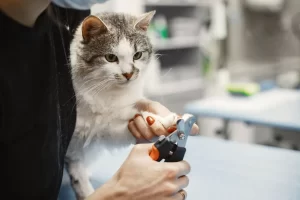
Regular grooming practices for ringworm prevention
Regular grooming is an important aspect of preventing ringworm in cats. The following are some tips for regular grooming practices that can help prevent ringworm:
- Brush your cat regularly: Brush your cat regularly to remove loose hair and distribute skin oils, which can help prevent skin infections.
- Bathe your cat regularly: Bathe your cat regularly using a medicated shampoo, as recommended by your veterinarian, to kill any fungal spores that may be present on your cat’s skin.
- Trim your cat’s nails: Trim your cat’s nails regularly to prevent scratches that can increase the risk of skin infections.
- Clean litter boxes regularly: Clean your cat’s litter boxes regularly to prevent the buildup of fungal spores.
- Wash bedding frequently: Wash your cat’s bedding, including blankets and toys, frequently to prevent the buildup of fungal fragments.
- Isolate infected cats: If you have an infected cat in your household, isolate them from other cats and handle them with caution to prevent the spread of the infection.
Environmental cleaning and disinfection to prevent ringworm in cats
Environmental cleaning and disinfection play a crucial role in preventing ringworm in cats. Here are some tips to follow:
- Regular surface cleaning: Clean all surfaces in the home, including counters, furniture, and floors, to avoid fungal fragment buildup.
- Use of disinfectants: Utilize disinfectants like vinegar or bleach to eliminate any present fungal fragments on surfaces.
- Frequent vacuuming: Vacuum the home regularly, especially in areas where your cat spends time, to eliminate hair and fungal fragments.
- Clean and disinfect bedding: Clean and disinfect your cat’s bedding such as toys and blankets frequently.
- Regular litter box cleaning: Clean the litter box regularly to prevent fungal fragment buildup.
- Isolation of infected cats: If there is an infected cat in the household, isolate them from other cats to prevent infection spread.
Use of anti-fungal shampoos and sprays
The use of anti-fungal shampoos and sprays is an effective method for treating and preventing ringworm in cats. Here are some commonly used anti-fungal shampoos and sprays:
- Chlorhexidine shampoo: This is a medicated shampoo that contains the antifungal ingredient chlorhexidine, which is effective against various types of skin infections, including ringworm.
- Miconazole spray: This is a topical antifungal spray that can be used to treat ringworm in cats. It helps to reduce fungal growth and prevent the spread of infection.
- Ketoconazole shampoo: This is an antifungal shampoo that contains ketoconazole, a powerful ingredient that helps to kill the fungus that causes ringworm.
- Lime-sulfur dips: Lime-sulfur dips are an effective treatment for ringworm in cats. They are applied to the affected area and help to kill the fungus and prevent the spread of infection.
- Terbinafine spray: This is an antifungal spray that contains the active ingredient terbinafine, which is effective against various types of fungal infections, including ringworm.
It is important to consult with a veterinarian before using any anti-fungal shampoos or sprays on your cat.
Understanding the contagious nature of ringworm in cats
Ringworm is a highly contagious fungal infection that can easily spread from one cat to another. It can also be transmitted to humans and other animals. Here are some key points to understand about the contagious nature of ringworm:
- Spread through direct contact: Ringworm can be spread through direct contact with an infected cat, its bedding, or grooming tools.
- Spread through indirect contact: The fungal spores that cause ringworm can survive for long periods of time in the environment and be spread through indirect contact with contaminated objects, such as brushes or toys.
- Human transmission: Ringworm can also be transmitted to humans, especially those with compromised immune systems, and it can be difficult to treat once it has spread.
- Other animals: Ringworm can also infect other animals, including dogs, horses, and cattle.
- Prevention is key: To prevent the spread of ringworm, it is important to follow good hygiene practices, regularly clean and disinfect the environment, and promptly isolate infected cats from other animals and humans.
By understanding the contagious nature of ringworm, you can take steps to prevent the spread of infection and protect your cat, other animals, and yourself.
Personal protective equipment for handling infected cats
Handling infected cats with ringworm requires taking proper precautions to avoid spreading the infection to yourself or others. Here are some personal protective equipment (PPE) recommendations:
- Gloves: Wear disposable gloves when handling infected cats or their belongings to reduce the risk of skin-to-skin transmission.
- Face mask: Wear a mask to reduce the risk of inhaling fungal spores, which can cause infection.
- Protective clothing: Wear protective clothing, such as a gown or coveralls, to prevent skin-to-skin contact with infected cats and their belongings.
- Footwear: Wear disposable booties or shoes that can be easily disinfected to prevent tracking fungal spores into other areas.
- Eye protection: Wear goggles or face shields to protect your eyes from splashes or sprays of fungal spores.
By following these PPE recommendations, you can reduce the risk of infection and protect yourself when handling infected cats with ringworm.
Medication, nutrition, and supplements for ringworm in cats
Medication, nutrition, and supplements play important roles in the treatment and management of ringworm in cats. Here’s a list of key points to consider:
- Anti-fungal medication: Antifungal medication, such as griseofulvin or terbinafine, is often prescribed by a veterinarian to treat ringworm in cats. The medication is usually given orally, although topical antifungal creams may also be used.
- Immune-boosting supplements: Supplements such as vitamins C and E, as well as omega-3 fatty acids, can help boost the immune system and support the cat’s natural ability to fight off infection.
- Balanced diet: Providing a balanced diet with essential nutrients, such as protein, vitamins, and minerals, is important for maintaining a healthy immune system and overall health.
- Hydration: Making sure your cat stays hydrated is important for their overall health and can help their body fight off infection.
- Avoiding immune-suppressing foods: Certain foods, such as processed foods or foods high in sugar, can suppress the immune system and should be avoided.
By incorporating medication, nutrition, and supplements into the treatment plan for ringworm, you can support your cat’s recovery and help prevent future infections.
The dangers of leaving ringworm in cats untreated: Understanding the complications
Ringworm is a highly contagious fungal infection that can cause serious complications if left untreated. Here are some of the most common consequences of untreated ringworm in cats:
- Spread of infection: If left untreated, ringworm can spread to other parts of the body, other animals, and even humans.
- Secondary infections: Ringworm can cause skin irritation and increase the risk of secondary bacterial infections, which can make the infection even more difficult to treat.
- Chronic skin infections: In severe cases, ringworm can cause chronic skin infections, which can lead to scarring and permanent damage to the skin.
- Immunosuppression: In some cases, ringworm can suppress the immune system, making the cat more susceptible to other infections.
- Psychological stress: Dealing with a chronic skin condition can cause psychological stress for cats, leading to behavioral changes such as decreased appetite, increased aggression, and altered sleep patterns.
- Economic impact: Treating ringworm in cats can be costly, and the ongoing care required to manage the condition can also have an economic impact.
It’s important to seek veterinary treatment as soon as possible if you suspect your cat has ringworm. Early diagnosis and treatment can help prevent these complications and ensure a full recovery for your pet.
Choosing the right veterinary specialist for ringworm in cats
If you suspect your cat has ringworm, it’s important to seek veterinary treatment as soon as possible. Here are the types of veterinary specialists who can help diagnose and treat ringworm in cats:
- General practitioner: A general practitioner is a primary care veterinarian who can diagnose and treat ringworm in cats. They can also refer you to a specialist if necessary.
- Dermatologist: A veterinary dermatologist is a specialist who has advanced training in skin conditions, including ringworm. They can diagnose ringworm using specialized diagnostic tests, such as fungal cultures, and provide more advanced treatments for the condition.
- Infectious disease specialist: An infectious disease specialist can help diagnose and treat ringworm, particularly in cases where the infection is spreading or has become complicated.
- Internal medicine specialist: An internal medicine specialist can help diagnose and treat ringworm in cats with underlying health conditions, such as those with compromised immune systems.
It’s important to choose the right veterinary specialist based on the needs of your cat. In some cases, a general practitioner may be able to diagnose and treat ringworm, while in others, a referral to a specialist may be necessary.

